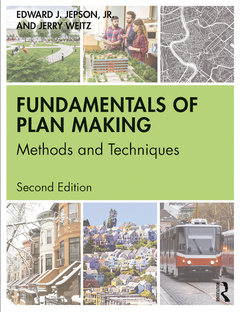Description
Fundamentals of Plan Making (2nd Ed.)
Methods and Techniques
Language: English
Keywords
American Community Survey; American Factfinder; planning techniques; Table DP04; planning methods; Local Comprehensive Plan; planning analyses; Comprehensive Plan; participatory planning; Census Designated Places; A.C; Nelson; Trip Generation Rates; land use plans; AICP; population projections; Average Household Size; development impact analysis; Impact Fee; aicp exam; Trend; urban planning; Dwelling Unit; Plan making; Peer Cities; Housing needs assessments; Housing Analyst; Community facilities and services; Impact Fee Program; Traffic Impact Analysis; TAZs; Housing Analysis; Simple Method; Trip Generation; WSS; Soil Survey; NAICS Code; CIP
Publication date: 12-2020
· 18.9x24.6 cm · Paperback
Publication date: 12-2020
· 18.9x24.6 cm · Hardback
Description
/li>Contents
/li>Readership
/li>Biography
/li>
Urban and regional planning programs aspire to prepare practitioners to write and implement comprehensive plans. Yet, academic planning programs often place greater emphasis on theory than practice. To help address this gap, Fundamentals of Plan Making gives planning students an understanding of research and methods of analysis that apply to comprehensive planning. Its informative text and examples will help students develop familiarity with various data sources and acquire the knowledge and ability to conduct basic planning analyses such as population projections, housing needs assessments, development impact analyses, and land-use plans. Students will also learn how to implement the various citizen participation methods used by planners and develop an appreciation of the values and roles of practicing planners.
In this revised second edition, Edward Jepson and Jerry Weitz bring their extensive experience as practicing planners and teaching faculty to give planning students the practical, hands-on tools they need to create and implement real plans and policies. With an entirely new census data set, expanded discussions of sustainability and other topics, as well as new online resources?including a companion website?the book is now more accessible and more informative, and its updated chapters on transportation, housing, environment, economic development, and other core planning elements also make it a handy reference for planning practitioners.
Edward J. Jepson, Jr. is a member of the American Institute of Certified Planners (AICP) and holds a Master of Regional Planning (MRP) degree from the Pennsylvania State University and a Doctor of Philosophy (Ph.D.) degree in urban and regional planning from the University of Wisconsin, Madison. Over the past 30 years, he has worked as the executive director of two nonprofit development organizations, a community planning and development consultant, a planning professor at the University of Tennessee, and is currently teaching at several major universities in the U.S. His research and scholarly work have focused on planning for sustainability, and his teaching experience includes courses on planning methods, economic development, planning theory, urban studies, and environmental planning.
Jerry Weitz is a Fellow of the American Institute of Certified Planners (FAICP) and holds a Ph.D. in urban studies, a Master of City Planning degree, and a Bachelor of Arts degree in political science and history. He has worked for city, county, regional, and state governments during his career, which spans 30 years. Since 2001, as president and principal of his own planning consulting firm, Jerry Weitz & Associates, Inc., he has prepared numerous local comprehensive plans and land-use regulations. From 2010 to 2015, he was associate professor and director of the urban and regional planning program at East Carolina University in Greenville, NC, where he taught land-use planning, land-use regulation, historic preservation planning, planning practice studio, and ecological landscape planning. From 2001 to 2014, Weitz was editor of the only member publication of the American Institute of Certified Planners (AICP), Practicing Planner.




